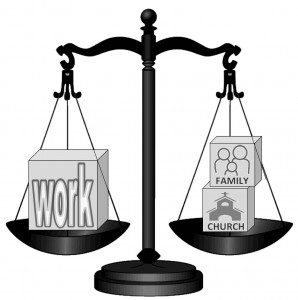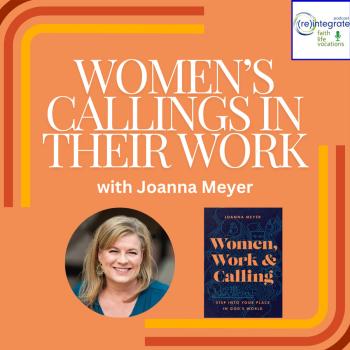 I just heard a Christian talk show host talk about how “men, in particular, are prone to be workaholics, putting their work before their family and/or their church.” (I have news for him, women struggle with this as well…). As a pastor, I have tried to help members of our congregation to live less chaotic lives. In the past, I’ve talked about the need to balance work and life.
I just heard a Christian talk show host talk about how “men, in particular, are prone to be workaholics, putting their work before their family and/or their church.” (I have news for him, women struggle with this as well…). As a pastor, I have tried to help members of our congregation to live less chaotic lives. In the past, I’ve talked about the need to balance work and life.
In a culture that celebrates the workaholic, pastors see too many people making work into an idol; they become too busy for family or church. When elders and deacons are sought, too many people turn down the opportunity to serve because their lives are too hectic.
Work – Life Balance
The churches I’ve had a privilege to serve have had the most success in ministry when we’ve helped make families healthy. We’ve offered tools and resources for stronger marriages. We’ve had seminars on better parenting skills. We’ve created environments where people can become friends so that they can encourage each other to live with the right priorities: to family, to church, to service.
The thinking of much of church ministry is this: We need to help you strike the right balance in your life. Sure, work is important. It is the means by which you provide for your family; it is the way you create wealth so that you can support church ministry and overseas missions; it is one of the venues in which you are called to share your faith with unbelievers. But remember that work is not
But remember that work is not that important. In an age where people overwork either on purpose (because they find too much significance in their work, or are succumbing to the temptation of greed and want to live a more extravagant lifestyle), or because it is thrust upon them (because of the need to pay mounting bills and debts, or because with downsizing, less people are now needed to do more work and if you want a job you have to work more than ever before), church leaders feel the need to find ways to help congregants balance work with the rest of life.
We’re Just Making it Worse
But here’s the rub: When we set work aside as if it were on one side of the scale with family and church on the other side, we have made a terrible mistake. In an effort to help, we are only exacerbating the problem—because we make work out to be contrary to and even opposing the “important” things in life. When that happens, work gets moved into a category that is separate from the Lordship of Jesus Christ.
What if, instead, we embraced the biblical understanding of the kingdom of God, in which God rules over all of creation? What if all of life is meant to be “spiritual,” even our work life? What if our pastoral ministries not only helped people serve in the local church and help create healthy families, but actually made sense of the work world as well? What if we attempted to rid ourselves of a fragmented view of life?
Harmony is a Much Better Framework
My teenage son Joel has been playing trombone now for several years. As I listen to him practice down in the basement, I enjoy the sound of his playing (It hasn’t always been like this… There are few things more grating to hear than a young boy blowing into a trombone as he first learns the instrument!). As he plays I enjoy the melody traveling up the stairs. Sometimes that melody is instantly recognizable, and I hum along. But at other times, I can’t identify the tune.
As Joel plays, I enjoy the melody traveling up the stairs. Sometimes that melody is instantly recognizable, and I hum along. But at other times, I can’t identify the tune. What is he playing? Often it is not the main melody, but a progression of notes that will add to the harmony of the entire band.
Listening to the full symphonic band is different from listening to just Joel playing his single trombone. The instruments complement each other, creating chord progressions that go toward a destination. There is a definite goal that the composer had in mind, and we are on the journey as we listen.
Think of God as the composer of our lives, with all the various aspects of our living in this world as different instrumental parts. Sometimes the flutes are the center of our attention, playing a sweet melody that is accompanied by the woodwinds and brass playing background harmonies. The music makes you smile as it skips along with joy. But then the brass takes over and with minor notes makes you anxious because you know of the tensions of living in a fallen world. The other instruments continue to play, and in fact, there in the back somewhere is that hint of joy still playing. The woodwinds begin playing the main melody and the others play harmony, and a whole new dimension of the piece is exposed.
It is all going somewhere, though. It is all working together toward a goal based on the succession of the chords’ root relationships. Even though I couldn’t understand it when I listened to just one instrument played by Joel sitting in the basement, the composer did as he wrote how the various instruments will create the symphony.
Work, Family, and Church (and anything else in our lives) are all part of that grand musical score. Let’s not think of “balancing” one of these over-and-against the others.
Let’s create a rhythm that makes it all work together for the glory of God. How are you “harmonizing” all the aspects of your life so that you are participating in the mission of God in the world in every one of them?
Image created by Bob Robinson













